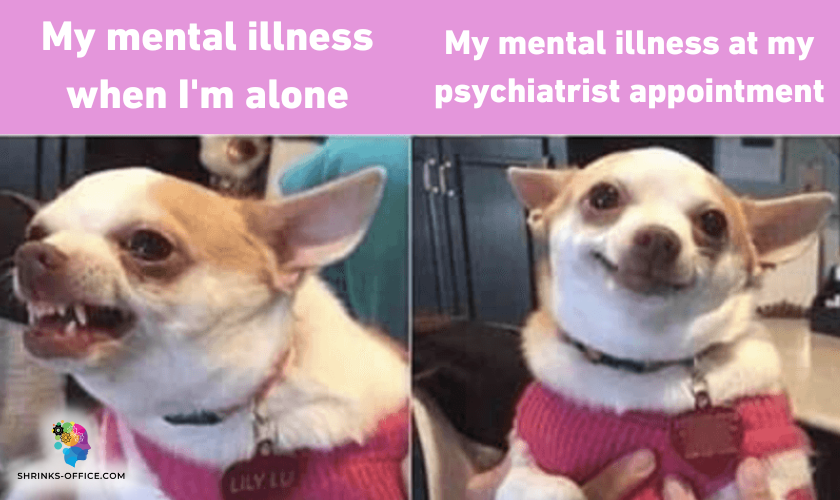Can an online therapist prescribe medication?
No, online therapists cannot prescribe medication. However, online therapists can work closely with a client's primary care provider or psychiatrist to coordinate medication management as part of a comprehensive treatment plan.
The common question is - can an online therapist prescribe medication?
In recent years, online therapy has become increasingly popular, offering individuals access to mental health care from the comfort of their own homes. However, some people wonder if online therapists have the authority to treat a mental health condition or prescribe medication.
In this blog post, we will explore everything you need to know about online psychiatry.

The role of therapists in medication management
Therapists play an important role in medication management, as they are often the first mental health professionals to assess a patient's symptoms and recommend medication if necessary.
While therapists are not medical doctors, cannot diagnose mental health conditions, and don't have the authority to prescribe controlled substances on their own, they often work closely with medical professionals to provide comprehensive care and treat specific mental health concerns and conditions. [1]
Types of therapists allowed to prescribe medication
- Psychiatrists
- Psychologists
- Clinical Social Workers
- Nurses
- Counselors
- Primary Care Physicians [2]

What is a psychiatrist?
A psychiatrist is a medical doctor who specializes in mental health services and in the diagnosis, treatment, and prevention of mental health disorders. Psychiatrists undergo extensive medical education and training, including a four-year medical degree and a four-year residency in psychiatry. [3]
Psychiatrists most of the time do not offer talk therapy but manage prescriptions and other medical treatments for their patients. They are trained to evaluate patients' mental health symptoms, conduct physical and psychological examinations, and develop mental health treatment plans. These plans include psychiatric medication, psychotherapy, or other forms of mental health specialty care.
Psychiatrists may also work with other mental health professionals to provide comprehensive care for their patient's many mental health conditions. It is a good choice to make use of both a psychiatrist and a therapist at the same time.
Can a psychiatrist become an online therapist?
Yes, psychiatrists can become online therapists if they obtain the necessary qualifications and training to provide therapy services online. [4]
As medical doctors, psychiatrists are highly trained mental health professionals who are qualified to do psychiatric evaluations, provide therapy and prescribe mental health medications.
Interesting Fact
An online psychiatrist offers invaluable support and tailored strategies to individuals dealing with the complexities of having a mentally ill parent, fostering resilience and improved coping mechanisms right from the comfort of their homes.
When should you see online psychiatrists?
- You are experiencing symptoms of a mental health disorder, such as depression, anxiety, bipolar disorder, or schizophrenia. These may include persistent feelings of sadness, worry, or fear, changes in appetite or sleep patterns, difficulty concentrating, or suicidal thoughts. [5]
- You are struggling to cope with stress, trauma, or major life changes, such as the loss of a loved one, a divorce, or a job loss. [6]
- You are experiencing difficulties with substance abuse or addiction and are in need of medication-assisted treatment.
- You have been diagnosed with a mental health disorder and are not responding well to treatment or medication prescribed by your primary care physician or therapist.
- You have a history of mental illness and are seeking ongoing treatment and management of your symptoms. [7]
What can an online psychiatrist prescribe?
- Antidepressants
- Antipsychotics
- Bipolar disorder agents
- Narcotics
- Opiate antagonists
- Anticonvulsants [8]

A Deep Dive into Online Prescriptible Mental Health Medications
Mental health disorders are diverse and complex, and treatment often requires an individualized approach. Medication, along with therapy, can play a crucial role in managing symptoms and improving quality of life. Here, we will discuss various types of mental health medications that can be prescribed online.
Antidepressants
Antidepressants are medications used to treat depressive disorders, including major depressive disorder and dysthymia, but they are also effective for other conditions. These include anxiety disorders, obsessive-compulsive disorder (OCD), post-traumatic stress disorder (PTSD), and certain eating disorders.
There are several types of antidepressants:
- Selective serotonin reuptake inhibitors (SSRIs): These are often first-line treatment for depression and anxiety disorders. Examples include fluoxetine (Prozac) and sertraline (Zoloft).
- Serotonin and norepinephrine reuptake inhibitors (SNRIs): These are used for depression, anxiety, and sometimes chronic pain conditions. Examples include venlafaxine (Effexor) and duloxetine (Cymbalta).
- Tricyclic antidepressants (TCAs): These are older medications, now typically used as a second or third line treatment. Examples include amitriptyline (Elavil) and nortriptyline (Pamelor).
Antipsychotics
Antipsychotics are primarily used to manage psychosis, including delusions, hallucinations, and disordered thought, particularly in schizophrenia and bipolar disorder. They can also be used as adjunctive treatment for depression.
- Typical antipsychotics: These are older medications that primarily target dopamine receptors. Examples include haloperidol (Haldol) and chlorpromazine (Thorazine).
- Atypical antipsychotics: These newer medications target a range of neurotransmitters and are often preferred due to fewer movement side effects. Examples include risperidone (Risperdal) and olanzapine (Zyprexa).

Mood Stabilizers
Mood stabilizers are most commonly used in bipolar disorder to prevent swings between mania and depression. Some are also effective in treating acute episodes of mania.
- Lithium: This is a first-line treatment for acute mania and for maintenance in bipolar disorder.
- Anticonvulsants: Some seizure medications also act as mood stabilizers. Examples include valproate (Depakote) and lamotrigine (Lamictal).
Anxiolytics
These medications are used to treat anxiety disorders. They include:
- Benzodiazepines: These medications quickly reduce symptoms of acute anxiety and can also be used for panic attacks. Examples include diazepam (Valium) and alprazolam (Xanax).
- Buspirone: This is a non-benzodiazepine anxiolytic, often used in generalized anxiety disorder.
While this list covers many of the medications commonly prescribed in online psychiatry, it's not exhaustive. Many other medications are used, including off-label uses of medications. It's also important to note that while these medications can be prescribed online, ongoing monitoring is essential. This involves regular check-ins with the prescribing professional to assess the medication's effectiveness and monitor for any potential side effects.
Helpful tip: By providing professional guidance, personalized treatment plans, and ongoing support, an online psychiatrist can be a crucial ally in your journey towards recovery from anorexia nervosa, all from the safety and privacy of your own home.

The Journey of Prescribing and Monitoring Mental Health Medications
The process of prescribing and monitoring mental health medication is a journey that involves several key steps. Let's break it down.
Initial Evaluation
The process starts with an initial evaluation, which typically involves a detailed interview about your symptoms, history, and overall health. The professional will use this information to determine whether medication might be beneficial. The evaluation might include:
- Symptoms: Your healthcare provider will ask about your current symptoms, their severity, and their impact on your life.
- Medical history: This includes any previous or ongoing health conditions. Some health issues can affect how certain medications work or increase the risk of side effects.
- Mental health history: This includes any past diagnoses, treatments, and their effectiveness. Past responses to medication can guide future treatment decisions.
- Lifestyle factors: This includes things like diet, exercise, sleep habits, and stress levels. These can all affect mental health and may influence the treatment plan.
- Personal and family mental health history: If a close relative has responded well to a certain medication, it might work well for you too.
Helpful tip: Online psychiatrists guide you through anxiety recovery stages, offering expert advice, support, and personalized strategies for healing.

Choosing the Medication
If medication is deemed appropriate, the next step is to decide which medication to try. The choice of medication will depend on several factors:
- Diagnosis: Different medications are used for different disorders. Sometimes, multiple diagnoses will require a combination of medications.
- Safety and side effects: Every medication has potential side effects, but not everyone will experience them. The healthcare provider will consider your health history and lifestyle when choosing a medication.
- Cost and availability: Unfortunately, cost can sometimes be a barrier to treatment. The provider will typically consider which medications are covered by your health insurance.
- Patient preference: Some people might have concerns or preferences that influence the choice of medication. For instance, some might want to avoid certain side effects, while others might prefer medications that don't require frequent dosing.
Important: If the cost of therapy is a concern, don't let it deter you from seeking the help you need. Take a look at our comprehensive list of resources offering free support, as well as online therapy platforms that take insurance, making mental health care accessible for everyone.
Monitoring the Medication
Once a medication is prescribed, monitoring is crucial. This involves regular check-ins to assess whether the medication is working and to catch any side effects early. Monitoring typically involves:
- Follow-up appointments: These may be in person or online. The frequency will depend on the individual and the medication, but it's usually more frequent when starting a new medication or changing the dose.
- Self-monitoring: Patients are often asked to keep a symptom diary or to note any side effects. This can be helpful information to bring to follow-up appointments.
- Lab tests: Some medications require regular lab tests to check levels of the medication in the blood or to monitor for side effects.
- Ongoing evaluation: If the medication isn't working or is causing problematic side effects, it might need to be changed or adjusted.
Remember, effective medication treatment is a partnership between you and your healthcare provider. Open communication is key to finding the best treatment plan for you.

Legal and regulatory considerations
Licensing and regulation of therapists and prescribing authority for both psychiatric services and medication vary across states and countries. In the United States, for example, only certain mental health professionals have the authority to prescribe medication, such as psychiatrists and nurse practitioners.
However, some states have granted prescribing authority to psychologists, social workers, and other therapists to prescribe controlled substances, under certain conditions. It is important for individuals seeking online therapy to research the laws and regulations in their state or country to understand the limitations of their therapist or healthcare professional's prescribing authority.
Online therapy platforms and medication management
Online therapy platforms vary in their policies on prescription medication and management. Some talk therapy platforms may require patients to see a medical doctor or Psychiatrist for medication prescriptions, while others may offer telemedicine services and allow therapists to prescribe prescription medications through the platform.
It is important for individuals seeking online therapy to research the policies of their chosen platform to understand how medication management is handled.

How to talk to a psychiatrist and get a prescription?
Be honest and open
It is important to be honest and open with your psychiatrist about your symptoms, medical history, and any other factors that may be affecting your mental health. This will help your psychiatrist develop an accurate diagnosis and treatment plan.
Ask questions
Don't be afraid to ask questions about your diagnosis, treatment options, and any medications that may be prescribed. This will help you better understand your condition and the medication you are taking.
Follow your treatment plan
Once you have received a prescription from your psychiatrist, it is important to follow your treatment plan and take your medication as directed. This will help ensure that you receive the maximum benefit from your medication and that you manage your symptoms effectively.
Communicate any concerns
If you experience any side effects or concerns about your medication, it is important to communicate this to your psychiatrist. They may be able to adjust your dosage or recommend an alternative medication.
Stay in touch
It is important to stay in touch with your psychiatrist and attend follow-up appointments as recommended. This will help ensure that your mental health treatment plan is effective and that you receive the support you need to manage your mental health. [9]

Pros and cons of online therapists prescribing medication
Pros
- Convenience
- Privacy
- Flexibility to schedule appointments and receive treatment
- Lower cost
- Eliminates the cost of transportation
- Availability of medication [10]
Cons
- Therapists may have limited information about the patient's medical history, physical symptoms, and other factors that are typically evaluated in person
- Lack of monitoring can lead to adverse reactions or complications if the medication is not monitored properly
- Legal and ethical considerations
- Online therapists may not have the authority to prescribe certain types of medication or may have restrictions on the dosage or frequency of medication they can prescribe
- Inability to respond to emergencies [11]
Conclusion
Although online therapists cannot physically provide medications, they can still be valuable resources for information and support. Some online therapy platforms have team members who hold prescribing rights and have the ability to refer clients to a psychiatrist for medication management if needed.
Remember to embrace the benefits of seeing an online therapist - flexible scheduling, location freedom, and personalized care for your mental health journey.
FAQ
Can online therapists prescribe medication for mental health conditions?
No, online therapists cannot physically prescribe medication. However, they may be able to refer clients to a psychiatrist or other licensed prescriber for further evaluation and a treatment plan.
What are the qualifications and requirements for online therapists to prescribe medication?
In order to prescribe medication, online therapists must hold a valid license in the state or region where they practice. Additionally, they must be trained and certified in prescribing medications for mental health conditions.
References
- Medicalnewstoday: Different types of mental health professionals
- MantraCare: Can Therapist Prescribe Medication?
- Healthdirect: Psychiatrists and psychologists
- BestAccreditedCollege: How to Become a Psychiatrist Online
- Thriveworks: Should You See a Psychiatrist? 7 Reasons To Consider It
- GoodTherapy: Why Should I Go to Therapy? 8 Signs It’s Time to See a Therapist
- Forbes: 10 Sure Signs You Need To See A Therapist (And How To Find The Right One)
- LiveHealthOnline: What Can a Psychiatrist Prescribe Online?
- KHealth: EVERYTHING YOU NEED TO KNOW ABOUT ONLINE PSYCHIATRISTS
- Medicalnewstoday: Online psychiatrist services: How they can help
- Verywellmind: The Pros and Cons of Online Therapy